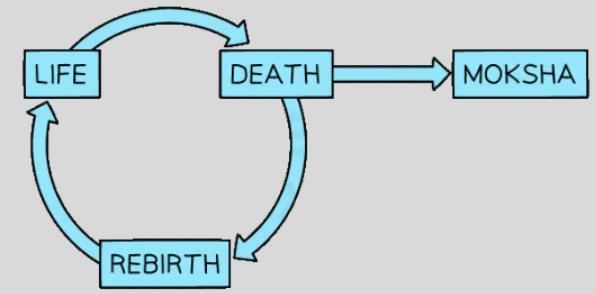Year 11 Exam > Year 11 Notes > Religion, Philosophy & Ethics for GCSE/IGCSE > The Cycle of Birth & Death
The Cycle of Birth & Death | Religion, Philosophy & Ethics for GCSE/IGCSE - Year 11 PDF Download
| Table of contents |

|
| Samsara |

|
| The Law of Karma |

|
| What is Moksha? |

|
| Types of Liberation |

|
Samsara
Samsara, often referred to as the "wheel of life" in Hindu philosophy, represents the continuous cycle of birth, death, and rebirth.
- It encompasses the journey of life, death, and reincarnation.
- An atman (soul) can inhabit the body of any living entity, such as a plant, animal, or human.
- Upon the death of a living being, its atman is reborn into a new body, determined by the karma accumulated in its previous life.
- The specific body into which the atman is reincarnated depends on the karma from the prior existence.
- The ultimate aim for Hindus is to break free from samsara by fulfilling their dharma (duty) and accumulating positive karma to attain moksha, which signifies liberation from rebirth and union with Brahman (the ultimate reality).
- Hindus perceive the cycle of birth, death, and rebirth as undesirable because the material world is considered an illusion filled with suffering, which all should strive to escape.
- Suffering is viewed as an inherent aspect of life, and moksha is seen as liberation from this suffering. Individuals contribute to their own suffering through actions in past lives.
The Law of Karma
What is Karma
Karma is the principle that every action, whether good or bad, has consequences that manifest in this life or the next.
- The intention behind an action is what primarily determines its karmic impact.
- Actions performed with pure intentions, regardless of their outcome, are more likely to generate positive karma.
- Actions motivated by selfish desires may result in negative karma, even if they appear benevolent outwardly.
- In Hinduism, karma is regarded as a universal "law," akin to a scientific principle.
- Karma provides a framework for understanding one’s place in the universe.
- Every action—words, deeds, or thoughts—creates a ripple effect in the cosmic order, shaping future experiences.
- Karma explains why some individuals experience more suffering than others.
- Greater suffering is seen as a consequence of negative actions in a previous life.
- A life with less suffering and greater prosperity is considered a reward for virtuous actions in past lives.
- The belief in karma motivates Hindus to perform good deeds in the present life to secure positive outcomes in future lives.
- The karma accumulated in the current life, which will influence the next, is known as kriyamana karma.
- Karma can lead to reincarnation into human or other living forms, which is why all living beings are respected within the religion.
What is Moksha?
Moksha is the ultimate goal in Hinduism, representing liberation from the cycle of reincarnation (samsara) and the fourth and final artha (life goal).
- Moksha signifies the end of the cycle of birth, death, and rebirth.
- It transcends all other arthas (goals).
- Achieving moksha requires overcoming ignorance and desire.
- It is attainable only after numerous successive reincarnations.
As stated in the Paingala Upanishad (2:11): “The desire for liberation arises in all human beings at the end of many births through the opening of their past virtuous conduct.”

- Moksha entails liberation from the limitations of the physical body, attaining ultimate knowledge of truth, and achieving blissful union with Brahman.
- Hindus believe moksha can be attained during life, not only after death.
- The Garuda Purana states: “When all desires stationed in the heart are dispensed with, one becomes liberated undoubtedly, even while living.”
- According to the Naradaparivrajaka Upanishad, a liberated individual exhibits the following qualities:
- Remains unaffected by disrespect and endures harsh words, while treating others respectfully regardless of their treatment.
- Responds to anger with kind and gentle words, never returning hostility.
- Speaks and upholds the truth, even under duress.
- Does not seek praise or blessings from others.
- Never harms any living being and is dedicated to the welfare of all.
- Feels equally at ease alone or in the company of others.
- Does not crave wealth and is content with a simple life.
- Places no importance on external appearances or rituals, valuing only knowledge.
- Considers knowledge of the Self paramount, above worship of God.
- Embodies humility, clarity of mind, straightforwardness, compassion, patience, indifference, courage, and speaks firmly yet kindly.
- To achieve moksha, Hindus must overcome all desires, including the desire for moksha itself.
Types of Liberation
What types of Liberation are there?
Hinduism recognizes various forms of liberation (moksha), though the exact number varies across texts.
- Different Hindu scriptures present differing views on the types of liberation.
- In the Bhagavatam, Lord Krishna, regarded as the supreme Brahman, describes four types of liberation and identifies the highest among them.
- Other Hindu texts mention five types of liberation:
- Salokya: Residing on the same planet as the Supreme Personality.
- Sarsti: Possessing equal opulence as the Supreme Lord.
- Samipya: Becoming a personal associate of the Supreme Lord.
- Sarupya: Acquiring bodily features similar to those of the Supreme Person.
- Sayujya: Merging one’s existence with Brahman.
The document The Cycle of Birth & Death | Religion, Philosophy & Ethics for GCSE/IGCSE - Year 11 is a part of the Year 11 Course Religion, Philosophy & Ethics for GCSE/IGCSE.
All you need of Year 11 at this link: Year 11
|
172 docs|3 tests
|
Related Searches



















